
Features | Lists
By The Staff
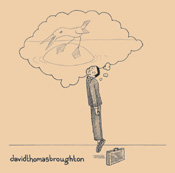
20 :: David Thomas Broughton
The Complete Guide to Insufficiency
(Bird War/Plug Research)
If you are David Thomas Broughton please don’t read this as I don’t want to jinx shit up.
This guy is too young to sound like this – a heap of beat-up, twisted, compromised human salvage that would be utterly back-hunching if it weren’t for the meditative melodies, the blues-folk coming-back-around feel, like the songs come from the sole remaining pure corner of his gut, somehow retaining an uplifting element despite running through his dark heart / black lungs / dirty mouth on their way out: “I wouldn’t take her to an execution / I wouldn’t take her to a live sex show / I wouldn’t piss or shit on her / because I love her so.” You’ve read Peter’s review, you know the background, the album being recorded in one take in a church, and how it’s got “cult following” smeared all over it. You know it’s just Broughton and a guitar and a little backwards looping, a little layered self-harmonizing, scary buzzing and whirring in the background, and sometimes unplanned church bells; and hopefully you can imagine how this setting sinks the listener deeper into “suspension of disbelief” quicksand, making this a first-hand experience with every listen, the interplay between the songs and the hairs on your neck serving as proof of an interactive experience. The risk of putting too much stock in this guy is high – this could be fortuitous serendipity captured once and forever: how could he have planned for the bells to toll then, who’d he sell his soul to? – but when you go back over “I try to pressurize / the thoughts of you I’m wanting / try to manipulate / your point of view / I wish that you were not / going where you’re going / everybody’s walking over you” and you realize that in one sitting Broughton has begun crafting his own little mythology like a Bejar or a Mangum or an Oldham, you can’t help but get excited, and frightened, for whatever’s next to come.
Aaron Newell

19 :: Bloc Party
Silent Alarm
(Wichita)
Every year there’s an album that comes out so early that it’s almost impossible to remember it come year-end Extravaganza time. The Walkmen’s Bows + Arrows was that album for me in 2004. And Bloc Party’s Silent Alarm definitely fit that bill for me this year. I couldn’t stop listening to this band’s hot EP and then the album proper when they first leaked, but over the long months that made up the rest of 2005, I ended up forgetting about them for one reason or another.
Part of it is surely due to the fact that I got my copy sometime in late 2004, but a big reason is the album’s instant ear-candy catchiness, which makes it feel somehow disposable. You don’t need to digest much of anything on a listen to Silent Alarm and that’s really what makes the band as great as they are. Even with instantly recognizable dance beat drumming and huge post punk guitars and the distinctive whiny British howl of singer Kele Okereke, odds were good that your head would be bobbing before you even realized that you were listening to a Bloc Party song. And while writing a catchy song is a frowned upon practice by some in the music world, tell me how easy it is when you hear the forced sound of the new Strokes album early next year.
The tossed off feel of catchy songs is one of most quickly dismissed things in music, but also one of the hardest (unless you are Robert Pollard). But credit goes to Bloc Party for making being so damn catchy so much fun. From the soaring chorus of “Like Eating Glass” to the shout-along “Price of Gas,” the more recent incarnations of post-punk have rarely sounded this effortless, assuring that while some of us may have forgotten Silent Alarm did indeed come out in 2005, we’ll still be listening to it in 2006.
Sean Ford

18 :: Broadcast
Tender Buttons
(Warp)
One of the main reasons I’m picking 2005 as the worst year for music since the turn of the decade is that the majority of good records that came out in the past twelve months were almost entirely sexless. Emasculate hip-hop stood in for fleshly crotch-rock, and the most grind friendly dance numbers were confined to obscure out of country compilations and unbelievably expensive twelve inches. Then Trish Keenan and her intoxicating brand of quelling memoirs and palpable lullabies came back into my life. Her no catch philosophy toward lyrics delivered with that iced out nonchalant intonation may not meet the typically accepted ideal of a siren (unless “The coal / the coal light / the colours / the caress” is doing it for you), but admitting to this lack of overt seduction doesn’t make it any more difficult to get taken in by said enchantress and the come-hither charms she cooks up. A real femme fatale for the no-wave generation, if there is such a thing.
But Tender Buttons isn’t completely without austerity; making heavy mention of the group’s whittling down from a trio to a duo and the subsequent complications that arise from such a precarious transition. Hardly the melodramatic types, the now fragmentary Broadcast make their most cohesive move to date and douse the album with an overwhelming feeling of release. Goodbyes are hard, but apparently not very inopportune. With cascades of vocal melody falling over jittery keys and preset drum patterns, Tender Buttons proved to be the group’s most snug statement about exactly what it is that they’re doing. The pair remains remarkably true to themselves; the album never cashes itself out for a gratis moment of wanton delectation, despite the heaps of potential magnetism tracks like the aptly titled “Corporeal” or the fluttering “Black Cat” might put up. The songs got a little simpler, and a lot more efficient. Broken down to its most basic elements, this is a cute British girl singing over a Gameboy textures cranked to eleven. Now what isn’t attractive about that?
Connor Morris
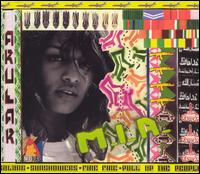
17 :: M.I.A.
Arular
(XL)
Buzz doesn’t even begin to describe it. Championed by bloggers, statued by zines, fawned over by every headband sporting hipster ages fifteen to twenty five. For the better part of 2005, M.I.A. was spitting Sri-Lankan word play (read: politically charged terrorist anthems, a call to arms if you will) to an acutely enrapt division of people. Ten thousand units flew off the shelves faster than you can say “ra ra,” and Interscope was quick to jump on the bustling young talent, giving Arular the proper release it deserved, with the initially scrapped club banger “URAQT” now in tow. But then it disappeared. Not since the Rapture had an artist gone from so titanic to so negligible so fast. Are all our favourite trends really this tenuous? I’ll be honest: when I sat down to get my blurb on, I hadn’t listened to this album in over three months. What a heralding experience it would be.
Somewhat surprising was how little Arular had changed. The 505 still packed a stalwart kick, the cowbells still clung unflinchingly to the background, and most imperative of all: the pop songstress was just as charismatic as she was the first time around. It’s difficult for an album with no discernible highs or lows to become debilitated. The gimmicks never exhaust themselves, conserving and reconstructing their baile funk and reggaeton grander to provide continued service to the get down kids at a later date. The new sound for the new breed provided a glimpse at a world not thoroughly tapped by the e-savvy. Tightly packing critical dancehall points into a thirty minute interval, and scaling off the zeroes that weighed down Piracy, Arulpragasam presented us with the most constantly and consistently gratifying function of the year.
Connor Morris
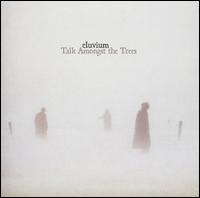
16 :: Eluvium
Talking Through the Trees
(Temporary Residence)
Snooze, right? An hour of electronic buzzes and slow-motion-at-half-speed samples that don’t really go anywhere so much as repeat, gestate and gently barrage you, then repeat over again until you either give up completely out of frustration/boredom (your loss) or start to slowly feel it out. There’s none of the usual helper aides of a chorus or tonal change letting you know that something’s happening, so don’t give up after two minutes because you still ain’t hearing a hook; this thing is almost non-existent except for the moments where Matthew Cooper creates something so subtly overwhelming that it begs you to listen deeper because it’s not just this pretty (pretty boring) wallpaper anymore. Then you do, and it’s kind of a rabbit hole from there; next thing you know you’ve got theories about this record really being about UFOs and crazy shit like that. Toph will never be the same.
Talking Through the Trees picks up where Lambent Material left off, replacing last year’s pretty-but-dull piano-only EP Accidental Memory in the Case of Death with more sampled and brilliantly layered, paced and manipulated atmospherics. At its best (“Taken,” “Everything to Come”), Cooper’s compositions (no, he didn’t just hold a Casio key for thirty minutes and hope for the best) circle around themselves, gathering dust and shadows like David Thomas Broughton when he grows three of himself to harmonize and whistle with, still kept full of minute detail despite carrying a tornado’s worth of debris. Well, maybe more of a winter’s breeze than a tornado…
Anyway, it’s everything Chris’ review and Chet’s blurb claim it is (“What sets Eluvium apart from the phonies is that his soundscapes are suggestive: the listener is nudged along to a conclusion, without forcing them to project their own feelings on someone’s solipsistic morass” being my favorite bit from those), and certainly worth the effort to actually hear and not just passively skim. You can judge a Louis XIV that way, sure, but this is actually worth the effort.
Scott Reid
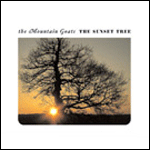
15 :: Mountain Goats
The Sunset Tree
(4AD)
The Sunset Tree is an album of profound rage, wistful sorrow, bitter tastes and broken bottles. Fifteen years in, John Darnielle’s Mountain Goats albums have grown only more refined; the term “concept album” doesn’t apply here, because there is no loose, overarching “concept”: this is a short story set to music, each track a heroically compact glimpse into Darnielle’s darkest corners. These brief glimmers of memory coalesce, and two characters form from the smoke: Darnielle, guarded and furious, and his stepfather, a monument to the quiet viciousness tearing away at the American male psyche. Lyrically, this is the album of the year, recalling a host of literary giants but most dominantly the ferocity, sadness and generosity of emotion prevalent in Wallace Stegner’s short stories.
Despite the weighty subject matter, The Sunset Tree is a defiantly “pop” album. “This Year” is a brazen, triumphant teenage anthem distilled to Darnielle’s literary purposes; the guitars and pianos whisper like wind through a car, the drums pound like its engine, or the kid’s drunken heart, or his grinding teeth, or his pants, growing too tight too quickly. As devastating as the lyrics can be, Darnielle’s still having fun, coyly writing a song about “Dance Music” and then keeping it wholly bereft of drums. Indeed, the tape hiss may be gone, and the fi may be decidedly hi, but the Mountain Goats remain a band devoted to musical purity. Every instrument is precision-placed for maximum efficacy, like the circling strings of “Lion’s Teeth” that bloom miserably, or the quivering violas of closer “Pale Green Things.”
And then there’s Darnielle’s voice – it may be the most perfect instrument on the album, shaking with resolve like an eleven-year-old fist clenched, nails digging blood. He gushes and sighs with the music, and, as narrator, his voice keeps the album from becoming a too-difficult exercise in psychotherapy. Darnielle doesn’t want our pity, and this album isn’t a funeral dirge. From the joyous rush of “Dance Music” to the harrowing “Hast Thou Consider the Tetrapod,” Darnielle refuses to drown, struggling to the surface if only to give praise to the redemptive powers of music. It’s this tenacity that keeps the album afloat, that keeps the listener engaged, that keeps Darnielle alive. The Sunset Tree is the sound of hope.
Clayton Purdom

14 :: Antony and the Johnsons
I Am a Bird Now
(Secretly Canadian)
Between this record and Wolf Parade, 2005 could arguably be called the year of the ghost in indie rock. Generationally speaking, we’d probably better get used to this trend: as the baby boomers get older they begin to die in greater numbers, and those people are are our parents and grandparents. And what happpens then, when all of this talk about the financial strain of retiring boomers becomes the emotional strain of the decade of funerals, and we become a large community of orphans?
These are the sorts of things that no one, understandably, wishes to spend any time reflecting on. Which makes I Am a Bird Now (doesn’t the title alone suggest supernatural transfiguration?) all the more remarkable: there’s a palpable dread in Antony’s cheeky croon, a voice that acknowledges “a ghost on the riser when I go to bed,” failing to draw comfort from the prospect of not dying alone and terrified that the ghost portends his own fate, to wander the tenements of New York City alone and unnoticed except by those already marked for death. This song, “Hope There’s Someone,” reminds us that we are all, of course, similarly marked.
That voice, arguably the best to come on our scene since Chan Marshall or Nina Nastasia, is aided in no small way by the patient and stately chamber-pop of the band it leads. It adds majesty to the melancholy “For Today I am a Boy,” a winking song about gender transformation that is, subtextually, about waiting for said transformation by simple aging, the same process which gives us our life as will eventually take it.
The expanded edition of this album adds several EPs which continue the themes of this record, chief among them “The Lake” (also on Devenda Banart’s excellent Golden Apples of the Sun comp) which sets the Edgar Allan Poe poem of the same name to music. Poe knew his way around ghosts, but “The Lake” is about finding solace in the abyss, of a “solitary soul who could make an Eden” of death. This elegant arrangement, and indeed the album it would follow, gives us that Eden.
Christopher Alexander
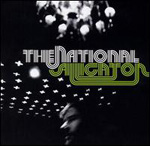
13 :: National
Alligator
(Beggar's Banquet)
It’s been forty years since the Beatles released Rubber Soul, signifying the maturation of rock ‘n’ roll. If the National’s Alligator is any indication, the aging genre is still in its golden years. Much like Rubber Soul, the formula of Alligator is quite straight-forward: well-constructed songs performed with both feeling and precision, standing on the strength of the band’s personality and great melodies. After a dalliance with alt-country that didn’t quite fit them, the band has stepped into a murkier, more electric style that they sound born to play.
Making a Beatles comparison is more than a little presumptuous, but the underlying greatness of Alligator as an album, and what makes it my favorite release of the year, is the darkness that John Lennon once explored in “Yer Blues” and solo songs like “Jealous Guy.” Singer Matt Berninger may clothe his emotions in more irony and hyperbolic sarcasm than the most blatant Beatle ever did, but there’s a core of depression here that rings just as true. Unlike late-career Lennon, though, Beringer does know how to be tongue-in-cheek, and the album’s mood swings from somber to self-deprecating faster than you can say “I used to be carried in the arms of cheerleaders.” Maybe not, but Alligator is easily one of the best rock albums of the year.
David Greenwald
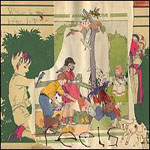
12 :: Animal Collective
Feels
(Fat Cat)
Calling Animal Collective a pop band always feels sort of like calling Radiohead a rock band: the term, while correct, just doesn’t come close to describing what the group does with music. Still, with Feels Animal Collective seems to have come closest to actively embracing its label, albeit still with enough squawks and droning to keep it well removed from the mainstream. That the squawking and droning has never sounded so good is a testament both to the fantastic production on display here and a band whose taste and compositional ability is growing up in the best way: learning the magic that makes songs like “Banshee Beat” and “Turn into Something” two of the best honest-to-goodness Pop Songs of the year while still maintaining the manic energy and childlike enthusiasm that made them great in the first place.
Peter Hepburn
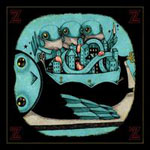
11 :: My Morning Jacket
Z
(ATO)
My Morning Jacket aficionados are a greedy lot. The first thing I immediately noticed about Z wasn’t the quality of the songwriting or beefed up production courtesy of British superstud (e.g., The Bends, A Northern Soul) John Leckie, but the fact that it was only 46 minutes long; roughly a half hour less than each of My Morning Jacket’s last two (and utterly fantastic) records. For shame. If a band actually has the capability to hold my interest for 76 minutes at a time like My Morning Jacket did on At Dawn and It Still Moves, then I begin to anticipate as much, and the vinyl length run time initially resulted in concern that new ideas were in short supply.
Z is one of my favorite records of the year, and yet it somehow felt so tossed off on first listen that it made me uncomfortable. Save the vintage MMJ sounding “Lay Low” and expansive closer “Dondante,” most of these ten songs hover around four minutes, and are completely bereft of the languid jams that most have come to associate with Jim James’s crew. For those expecting another 70+ minute platter of Sigur Rós going country-western, honest to goodness power-pop jams like the ones in “Anytime” and “What a Wonderful Man” couldn’t help but sound a little skimpy when compared to the likes of “I Will Sing You Songs” and “Strangulation!”
But once you overcome initial expectations as to what a My Morning Jacket record is supposed to sound like, repeated listens reveal just as much detail as anything in their decorated back catalogue. It’s simply presented in a tighter, more traditionally streamlined package. Jim James still records his vocals in a grain silo, and the band’s trademark overdriven reverb remains; particularly in the reggae stylings of cavernous opener “Wordless Chorus” and the wispy country-dub of “It Beats 4 U.” Couple this with a ravenous music press that’s only recently started referring to the band as the “American Radiohead,” and the conclusion is an inevitable one: My Morning Jacket have yet to release a less than excellent album, and we’ll never see them rock a 200-seat venue again.





